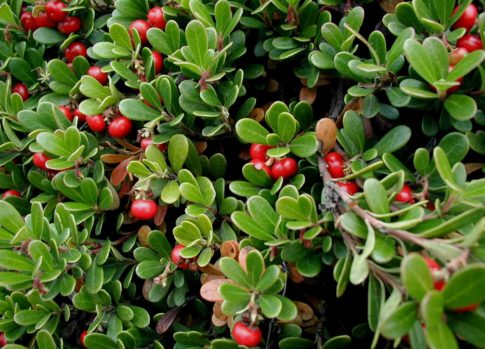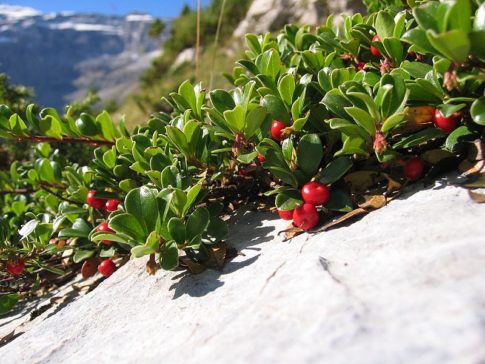
Bearberry (Arctostaphylos Uva-Ursi)
Bearberry tea works miracles for urinary tract infections. If you drink bearberry tea and add a little sodium bicarbonate to each cup (4 cups per day), because the urine has to be alkaline for the bacteria killing substances in bearberry to do their work best, then any urinary tract infection should be history fast, especially if you combine the treatment with acupuncture and neural therapy (according to Dr. Huneke). The herb should only be taken for a few days and NOT long-term. For more information on bearberry see the article down below.
* * *
Thirtieth donation in 2016.
Infinite Unknown reader A.K. donated $10 (AUD)
Thank you for your continuing support!
Very much needed and appreciated.
* * *
Donations in June: £50, $10 (AUD)
Donations in May: $85, £25, $10 (AUD)
Donations in April: $75, £25 $50,00 (CAD), $10 (AUD)
Donations in March: $30, £25, $10 (AUD)
Donations in February: $245, £25
Donations in January: $85, £25
* * *
Donations in 2016: $520 £125, $50,00 (CAD), $30 (AUD)
* * *
PayPal: Donate in USD
PayPal: Donate in EUR
PayPal: Donate in GBP
PayPal: Donate in AUD
PayPal: Donate in CAD
PayPal: Donate in CHF* * *
– Uva Ursi (Arctostaphylos Uva-Ursi)
Uva Ursi Benefits
Arctostaphylos uva ursi is a plant species of the genus Arctostaphylos (manzanita). The leaves of this small shrub have been used as an herbal folk medicine for centuries as a mild diuretic and astringent, and in the treatment of urinary tract infections such as cystitis, urethritis and nephritis, pyelitis and in pyelonephritis. Uva ursi can help to reduce accumulations of uric acid and relieve the pain of bladder stones. Uva ursi is also helpful for chronic diarrhea. As a nutritional supplement and muscle relaxant, Uva ursi soothes, strengthens, and tightens irritated and inflamed tissues.
Medicinal use
Uva ursi has a history of medicinal use dating back to the 2nd century. It has been widely used as a diuretic, astringent, and antiseptic. Folk medicine around the world has recommended Uva Ursi for nephritis, kidney stones, and chronic cystitis. The herb has also been used as a general tonic for weakened kidneys, liver or pancreas. Native Americans used it as a remedy for headaches, to prevent and cure scurvy and to treat urinary tract infections. In fact, until the discovery of sulfa drugs and antibiotics, Uva ursi was the treatment of choice for such bladder and related infections. Through modern day scientific research in test tubes and animals, Uva ursi’s antimicrobial properties, which can help fight infection, and diuretic effects have been demonstrated.
Uva ursi may be of great value in diseases of the bladder and kidneys, strengthening and imparting tone to the urinary passages. The diuretic action is due to the glucoside arbutin, which is largely absorbed unchanged and is excreted by the kidneys. During its excretion, arbutin exercises an antiseptic effect on the urinary mucous membrane. Therefore, it is used in inflammatory diseases of the urinary tract, urethritis, cystisis, etc.
Astringent properties
This herb helps prevent postpartum infection. Uva Ursi is also helpful for chronic diarrhea. As a nutritional supplement and muscle relaxant, Uva Ursi soothes, strengthens, and tightens irritated and inflamed tissues. The herb neutralizes acidity in the urine, increasing urine flow, therefore reducing bloating and water retention, making it beneficial for weight loss. Uva ursi’s astringent properties may also assist in the treatment of some bed wetting problems.
Uva ursi also contains allantoin which is well known for its soothing and tissue-repairing properties. Externally, it has been used as an astringent wash for cuts and scrapes and applied externally for back sprain.
Urinary Tract Infections
Uva Ursi contains chemicals, primarily hydroquinone and hydroquinone derivatives, that make it potentially useful for urinary conditions and is used to treat infections such as cystitis, urethritis and nephritis. The hydroquinone derivative, arbutin, is the chief active compound in uva ursi. It is absorbed in the stomach and converted into a substance with antimicrobial, astringent, and disinfectant properties. During urination, as it passes out of the body it acts on the mucus membranes of the urinary tract to soothe irritation, reduce inflammation, and fight infection. Interestingly, arbutin taken alone is not as effective as the whole Uva Ursi plant in controlling urinary tract infections. That’s because intestinal bacteria can break down arbutin, but they are less likely to do so in the presence of other Uva Ursi compounds.
Uva Ursi has been approved for treating inflammation of the lower urinary tract by Commission E of the German Federal Institute for Drugs and Medical Devices, which is the German governmental agency that evaluates the safety and effectiveness of herbal products. An astringent shrinks and tightens the top layers of mucous membranes, thereby reducing secretions, relieving irritation, and improving tissue firmness.
Uva Ursi also contains diuretic chemicals, including ursolic acid, powerful astringents, and a chemical that helps promote the growth of healthy new cells, allatoin. In addition to its antiseptic and astringent actions, uva ursi may help to flush out bacteria by promoting urination. It has been used to reduce the accumulation of uric acid and relieve pain of bladder stones. The diuretic action may relieve the bloating feeling associated with menstruation.
E. Coli
Uva Ursi has been reported to be effective against E. coli. Preparations made from bearberries act anti-bacterially in vitro against Proteus vulgaris, E. coli, Ureaplasma urealyticum, Mycoplasma hominis, Staphylococcus aureus, Pseudomonas aerginosa, Friedlander’s pneumonia, Enterococcus faecalis, and Streptococcus strains, as well as against Candida albicans. The anti-microbial effect is associated with the aglycone hydroquinone released from arbutin (transport form) or arbutin waste products in the alkaline urine.
High Blood Pressure
Diuretics are often prescribed to treat high blood pressure. However as they also deplete the body’s potassium, it is advisable to increase your intake of fresh vegetables and bananas. Diuretics are also prescribed for congestive heart failure. However, consultation with a doctor before using uva ursi for these reasons is advisable.
Wounds/Infections
Allantoin contained in uva ursi is an active ingredient in many over the counter creams to treat cold sores, herpes, and vaginal infections.
Diarrhea
Astringent tannins found in this herb are binding and help relieve diarrhea.
* * *
Uva Ursi Herb Notes / Side Effects
Latin Names
Arctostaphylos uva-ursi
Common Names
Arberry, Arbutus, Bearberry, Bear’s Berry, Bear’s Grape, Carillo, Chipmunk’s Apples, Coralillo, Crowberry, Foxberry, Hogberry, Kinnikinnick, Manzanita, Mealberry, Mountain Box, Mountain Cranberry, Mountain Tobacco, Pinemat Manzanita, Red Bearberry, Rockberry, Sandberry, Sagackhomi, Sagakomi, Upland Cranberry, Uva-Ursi, Whortleberry.
Properties
Anti-bacterial, anti-microbial, anti-septic, astringent, diuretic, relaxant (muscle), tonic for kidneys, liver and pancreas.
Indicated for
Chronic diarrhea, cystitis, gonorrhea, nephritis, pyelitis, pyelonephritis, urethritis, urinary tract infections, reduce accumulations of uric acid, relieve the pain of bladder stone, soothes, strengthens, and tightens irritated and inflamed tissues, treat cold sores, herpes, and vaginal infections.
Many people experience urinary tract infections as a frequent urge to urinate and a burning or otherwise painful sensation when voiding. Consult a doctor if these kinds of signs or symptoms persist for more than 24 to 36 hours because potentially serious complications can develop, including kidney problems.
Because of a lack of information regarding safety, children, people with kidney disease, pregnant women, and breast-feeding mothers should not take Uva Ursi. Large doses may stimulate uterine contractions during pregnancy. People with high blood pressure should consult a doctor before using Uva Ursi.
Because Uva Ursi requires an alkaline urine for its antimicrobial properties to work, those taking Uva Ursi should avoid eating acidic foods like citrus, pineapple, tomato. Prescription drugs such as ammonium chloride, non-prescription products such as vitamin C, herbals such as rose hips, and foods such as cranberry juice may all make the urine more acidic in nature. Potentially, taking a urine acidifier may lessen or destroy the antibacterial effects of Uva Ursi.
On the other hand, urinary alkalizers, drugs such as antacids, Bicitra, K-lyte, Polycitra, and sodium bicarbonate; herbals such as alfalfa and peppermint; and foods such as molasses, raisins, spinach, and some dried beans reduce the acid levels in urine, which may increase Uva Ursi’s antibacterial effects.
Uva Ursi should only be taken for short periods (no longer than a week), and not repeated more than five times in one year.
While some people with sensitive stomachs develop nausea and vomiting with Uva Ursi, the herb appears to be quite safe for most people when taken at commonly recommended doses. However, high doses can cause a disconcerting, although apparently harmless, greenish-brown discoloration of the urine.
Extremely high doses of Uva Ursi, in the range of 10 times greater than the commonly recommended amount, can cause vomiting, ringing in the ears, shortness of breath, convulsions, and collapse in some cases. Liver damage is also a risk with high doses taken over extended periods of time. In a dose of 6,000 mg (6 grams) or higher taken at one time, Uva Ursi may cause seizures or cyanosis (a blue tint to the skin caused by a lack of oxygen in the blood). Single doses of 30,000 mg (30 grams) or higher have been reported to cause death. A case study of several individuals who regularly used large amounts of an oral product similar to Uva Ursi for many years, found that they had a higher incidence of tongue and lip cancer than expected. Cancers of the nose and esophagus may also be more likely in people who use large amounts of tannin-containing products for long amounts of time.
